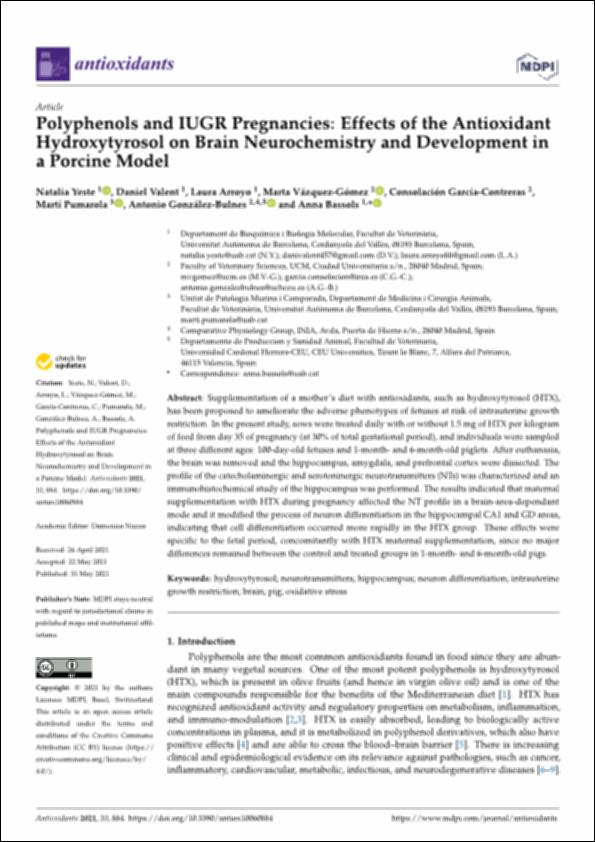Please use this identifier to cite or link to this item:
http://hdl.handle.net/10637/13559Polyphenols and IUGR pregnancies : effects of the antioxidant hydroxytyrosol on brain neurochemistry and development in a porcine model
| Title: | Polyphenols and IUGR pregnancies : effects of the antioxidant hydroxytyrosol on brain neurochemistry and development in a porcine model |
| Authors : | Yeste Vizcaino, Natalia Valent López, Daniel Arroyo, Laura Vázquez Gómez, Marta García Contreras, Consolación Pumarola i Batlle, Martí González de Bulnes López, Antonio Bassols Teixidó, Anna |
| Keywords: | Hidroxitirosol - Efectos fisiológicos en los animales.; Hipocampo (Cerebro) - Efectos de los productos químicos.; Hippocampus (Brain) - Effects of chemicals on.; Hydroxytyrosol - Physiological effect.; Neurotransmisores.; Neurotransmitters.; Células - Diferenciación.; Food additives.; Cerdos - Neurología.; Swine - Neurology.; Cell differentiation.; Estrés oxidativo.; Oxidative stress.; Alimentos - Aditivos. |
| Publisher: | MDPI |
| Citation: | Yeste, N., Valent, D., Arroyo, L., Vázquez-Gómez, M., García-Contreras, C., Pumarola, M., González-Bulnes, A. & Bassols, A. (2021). Polyphenols and IUGR pregnancies : effects of the antioxidant hydroxytyrosol on brain neurochemistry and development in a porcine model. Antioxidants, vol. 10, i. 6 (31 may.), art. 884. DOI: https://doi.org/10.3390/antiox10060884 |
| Abstract: | Supplementation of a mother’s diet with antioxidants, such as hydroxytyrosol (HTX), has been proposed to ameliorate the adverse phenotypes of fetuses at risk of intrauterine growth restriction. In the present study, sows were treated daily with or without 1.5 mg of HTX per kilogram of feed from day 35 of pregnancy (at 30% of total gestational period), and individuals were sampled at three different ages: 100-day-old fetuses and 1-month- and 6-month-old piglets. After euthanasia, the brain was removed and the hippocampus, amygdala, and prefrontal cortex were dissected. The profile of the catecholaminergic and serotoninergic neurotransmitters (NTs) was characterized and an immunohistochemical study of the hippocampus was performed. The results indicated that maternal supplementation with HTX during pregnancy affected the NT profile in a brain-area-dependant mode and it modified the process of neuron differentiation in the hippocampal CA1 and GD areas, indicating that cell differentiation occurred more rapidly in the HTX group. These effects were specific to the fetal period, concomitantly with HTX maternal supplementation, since no major differences remained between the control and treated groups in 1-month- and 6-month-old pigs. |
| Description: | Este artículo se encuentra disponible en la siguiente URL: https://www.mdpi.com/2076-3921/10/6/884 Nota de Fondos: Este artículo se encuentra a texto completo en el CEU Repositorio Institucional. Este artículo pertenece al número especial "Natural or Synthetic Antioxidants for Neurodegenerative Diseases and Brain Health". |
| URI: | http://hdl.handle.net/10637/13559 |
| Rights : | http://creativecommons.org/licenses/by/4.0/deed.es |
| ISSN: | 2076-3921 (Electrónico) |
| Issue Date: | 31-May-2021 |
| Center : | Universidad Cardenal Herrera-CEU |
| Appears in Collections: | Dpto. Producción y Sanidad Animal, Salud Pública Veterinaria y Ciencia y Tecnología de los Alimentos |
Items in DSpace are protected by copyright, with all rights reserved, unless otherwise indicated.


